 Leading Blog | Posts by Month |
 Leading Blog | Posts by Month |
10.31.25

LeadershipNow 140: October 2025 Compilation
See more on
Posted by Michael McKinney at 08:33 AM
10.30.25

Leading Thoughts for October 30, 2025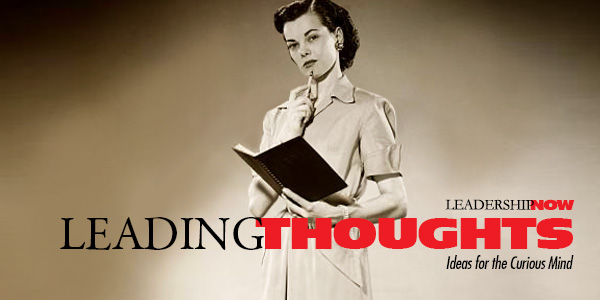
IDEAS shared have the power to expand perspectives, change thinking, and move lives. Here are two ideas for the curious mind to engage with: Robert A. Heinlein on the importance of knowing your history: “A generation which ignores history has no past —and no future.” Source: Time Enough for Love Rasmus Hougaard and Jacqueline Carter on AI objectivity: “We all like to think we’re wise. And in our own ways, we are. But we’re also all quite limited. A powerful way for leaders to leverage the potential of AI systems is to use it to challenge what they think they know and who they think they are. In leadership, it’s incredibly beneficial to people who are willing to tell you when you’re making a big mistake. But as we rise through the ranks of leadership, it can be more and more difficult to surround ourselves with people who are comfortable challenging us. This reluctance among peers or subordinates is due to positional power and natural human biases regarding social hierarchies. Source: More Human: How the Power of AI Can Transform the Way You Lead Look for these ideas every Thursday on the Leading Blog. Find more ideas on the LeadingThoughts index.
Posted by Michael McKinney at 09:59 AM
10.28.25

How to Thrive Under Fear-Based Leaders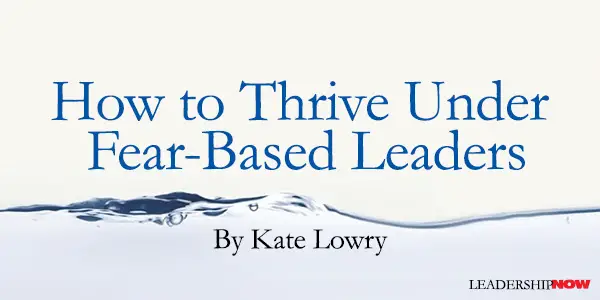
In our fast-changing world, fear-based leaders rise quickly—tightening their grip as chaos grows. But what if you could learn to predict their behavior, neutralize their impact, and protect what matters most? A new style of leader is in town, and it’s a blast from the past. Across tech, business, and the social sector, fear-based leadership is suddenly all the rage. This type of leadership started thousands of years ago, when some of the first humans to experience power dynamics decided to abuse it. It’s a “might makes right” approach — top down, hierarchical, and “my way is the highway.” Leaders like this model themselves after feudal lords, and if you’re around them, they expect you to bow down. They deliberately manufacture chaos, because when other people are shaken by instability, it makes them easier to control — and reinforces that the leader is the lone source of truth in the ecosystem. A lot of people are thrown by this. They see people around them being yelled at, shamed, and belittled, and feel like they’re trapped in a dark parallel universe that makes no sense. I’m here to tell you that these leaders and their chaos are not illogical — they just follow a different type of logic. If you can understand how they think and make decisions, they become highly predictable. And the thing about predictable people is that tactics work very reliably on them. Some things to understand how they think:
Accordingly, here are some of the tactics that work best on them, whether they’re your investor, board member, church leader, or family member:
Know that as you deal with these very difficult personalities, you’re not alone — and there is hope. They’re not monsters, they’re just very flawed humans, and if you have the skills to manage them, you can protect what you care about most.  
Posted by Michael McKinney at 06:31 PM
10.23.25

Leading Thoughts for October 23, 2025
IDEAS shared have the power to expand perspectives, change thinking, and move lives. Here are two ideas for the curious mind to engage with: Jeffrey Pfeffer on authenticity: “The last thing a leader needs to be at crucial moments is ‘authentic’—at least if authentic means being both in touch with and exhibiting their true feelings. In fact, being authentic is pretty much the opposite of what leaders must do. Leaders do not need to be true to themselves. Rather, leaders need to be true to what the situation and what those around them want and need from them.” Source: Leadership BS: Fixing Workplaces and Careers One Truth at a Time Steven Goldbach and Geoff Tuff on getting behind the interpretation: “People frequently speak to each other at the level of a conclusion rather than sharing the data or how they interpreted the data. As a result, when people disagree, they may be doing so simply because they aren’t looking at the foundational information that drew them to different conclusions. ” Source: Provoke: How Leaders Shape the Future by Overcoming Fatal Human Flaws Look for these ideas every Thursday on the Leading Blog. Find more ideas on the LeadingThoughts index.
Posted by Michael McKinney at 02:32 PM
10.16.25

Leading Thoughts for October 16, 2025
IDEAS shared have the power to expand perspectives, change thinking, and move lives. Here are two ideas for the curious mind to engage with: Zelana Montminy on pausing: “Give yourself permission...to stop sprinting on fumes. To admit the pace is breaking you. To feel the ache beneath the momentum. To stop performing energy you don’t have. You don’t need another protocol. Another cold plunge. Another fix-it morning routine. You need a moment to breathe without performing your peace. This summer, let slowness be sacred. Let rest be whole, without the guilt. Let the world keep pushing. You get to pause. You get to be real, not relentless.” Source: Finding Focus: Own Your Attention in an Age of Distraction Ian Wilson on not knowing: “We equate managerial competence with ‘knowing,’ and assume that decisions depend on facts about the present and about the future. Of course, the reality is that we have no facts about the future. However good our futures research may be, we shall never be able to escape from the ultimate dilemma that all our knowledge is about the past, and all our decisions are about the future.” Source: PDF From Scenario Thinking to Strategic Action Look for these ideas every Thursday on the Leading Blog. Find more ideas on the LeadingThoughts index.
Posted by Michael McKinney at 10:20 AM
10.09.25

Leading Thoughts for October 9, 2025
IDEAS shared have the power to expand perspectives, change thinking, and move lives. Here are two ideas for the curious mind to engage with: Robert Dilenschneider on respect: “ A starting point to develop and demonstrate respectfulness is to first respect yourself. You cannot respect others if you do not respect yourself. Paradoxically, gaining self-respect requires not looking to others for respect or validation. It is a quality that must come from within. Then, and only then, can it extend outwardly authentically.” Source: Respect: How to Change the World One Interaction at a Time Sébastien Page on debating with brilliant people: “‘Your idea is not you.’ He believes you should approach intellectual debates on technical or complex matters with open-minded curiosity and an unquenchable thirst for the truth. You shouldn’t take anything personally. Start by putting all the facts on the table. Too often, heated debates occur because people aren’t starting from the same facts. And before you disagree, take a second to point out something you agree on. Explain that you’re about to debate ideas, nothing personal. Encourage people to be clear when they’re playing devil’s advocate. With clear rules of the game and genuine respect amongst members, IQ-led debates can turn into positive experiences. There’s no reason to sacrifice relationships to get there. ” Look for these ideas every Thursday on the Leading Blog. Find more ideas on the LeadingThoughts index.
Posted by Michael McKinney at 08:42 AM
10.02.25

Leading Thoughts for October 2, 2025
IDEAS shared have the power to expand perspectives, change thinking, and move lives. Here are two ideas for the curious mind to engage with: Math teacher Dan Meyer on real-world problem solving: “What problem have you solved, ever, that was worth solving where you knew all the given information in advance? No problem worth solving is like that. In the real world, you have a surplus of information and you have to filter it, or you don’t have sufficient information and you have to go find some.” TED Talk: Math Class Needs A Makeover Bob Goff on focus: “We need to block our view of the things that hardly matter at all, stop returning to the patterns that do not serve our larger objectives, start recognizing what is temporary and transitory, and instead focus intensely on the things that will last forever: our faith, our families, and our purposes. When you direct your attention to these things, you will find your joy.” Source: Undistracted: Capture Your Purpose. Rediscover Your Joy Look for these ideas every Thursday on the Leading Blog. Find more ideas on the LeadingThoughts index.
Posted by Michael McKinney at 07:55 AM
10.01.25

First Look: Leadership Books for October 2025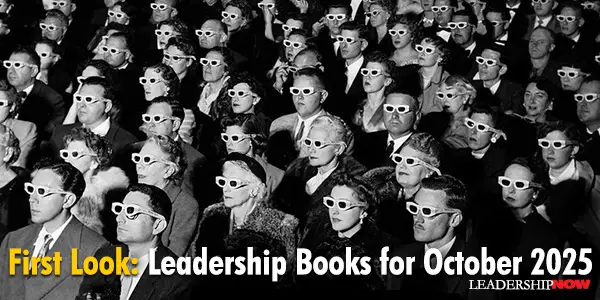
HERE'S A LOOK at some of the best leadership books to be released in October 2025 curated just for you. Be sure to check out the other great titles being offered this month.
In the high-stakes world of corporate leadership, becoming a Fortune 500 CEO is an Everest-like ascent—with only the savviest managing to avoid falling off the mountain. In A CEO for All Seasons,you’ll find an essential climbing route that will take you through every stage. Unique in applying a number of sophisticated metrics to isolate the world’s top 200 CEOs, reduce them to a representative sample, and then reap their wisdom, the McKinsey team, in A CEO for All Seasons, spotlights the specific stage-based hurdles that CEOs face. From preparing for the role to starting strong to sustaining momentum to ensuring a lasting legacy, the book leaves no segment of the journey unmapped. Along the way, it offers proven strategies for maintaining forward progress and, crucially, alerts readers to common blind spots that can sabotage success, as revealed by a detailed survey of thousands of executives.
"Just be yourself" might be the worst advice you've ever received. For years, we've been told that authenticity is the key to success—that we should be true to ourselves, tune out others' opinions, and lead with unwavering genuineness. This feel-good message has spawned countless self-help books, leadership seminars, and viral social media posts. There's just one problem: science says it's wrong. Drawing on decades of research, renowned psychologist Tomas Chamorro-Premuzic reveals an uncomfortable truth: our obsession with authenticity is backfiring. From Silicon Valley's authenticity worship to failed diversity programs, he exposes how our fixation on our "true selves" undermines both individual and organizational success.
Ever wonder why some of our most effective leaders aren’t known for the skills we’ve been told are essential for great leadership? Would you describe Elon Musk or Steve Jobs as having empathy or humility? Of course not, and yet they’ve led teams that achieved extraordinary results. So, what leadership attributes, habits, and skills do cause teams to become more than the sum of their parts? Why does a team made of up superstars often underperform? What causes teams to work together effectively and produce high team intelligence? Jon Levy unpacks the myths that hold leaders and their teams back and points out the paradox of success: focusing on creating teams that operate well is what makes an effective leader, but focusing purely on the leader does almost nothing for the team.
Your mindset may be the only thing standing between you and your potential. Break free from the beliefs that hold you back. As a leader, do you find yourself frustrated, wondering why employees don't meet expectations, peers are slow to act, or pressure from your boss falls unfairly on your shoulders? It's easy to point a finger at others and double down on getting results. But have you ever considered that the problem might not be them—that it might be you? In Leadership Unblocked, Wilkins reveals seven key beliefs that hold leaders back, from "I know I'm right" to "I need to be involved" to "I don't belong here." Combining illustrative and powerful coaching conversations and research from the fields of neuroscience, leadership, and adult development theory, Wilkins offers a self-coaching guide for identifying, unpacking, and breaking through these barriers.
In Delivering the WOW, Fain shows how a culture united people around a mission, delighted guests, and unlocked extraordinary performance. Drawing on vivid stories from 33 years at the helm, Fain explains how a remarkable culture was forged and strengthened through: • Alignment: ensuring every employee understands the same clear mission, beyond hierarchy or titles • Intentionality: never losing sight of the ultimate goal and ensuring that every action, big or small, supports that objective • Continuous improvement: never being satisfied; always believing that there are ways to improve • Crisis response: deeply rooted culture as a stabilizing force during black swan events, including the global pandemic. Invaluable principles like these are woven into unforgettable stories which help explain how the company's profitability, guest capacity, and employee base all grew more than thirtyfold.
Robert Dilenschneider delivers an insightful and original discussion of how to cultivate respectfulness in every facet of your life. You’ll learn how to embody and encourage respectful behavior and speech among work colleagues, family, friends, and others. You’ll learn about how respectfulness has life-changing consequences for all who practice it and why it’s within reach for us all. You’ll also discover why it’s so sorely needed in an increasingly fragmented society and how it can transform our interactions for the better.
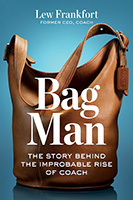 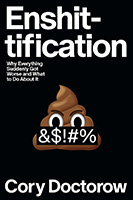 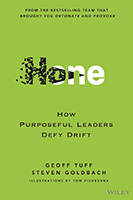 
“You can't think well without writing well, and you can't write well without reading well. And I mean that last "well" in both senses. You have to be good at reading, and read good things.” — Paul Graham, Y Combinator co-founder
Posted by Michael McKinney at 08:58 AM
|
BUILD YOUR KNOWLEDGE


How to Do Your Start-Up Right STRAIGHT TALK FOR START-UPS 
Grow Your Leadership Skills NEW AND UPCOMING LEADERSHIP BOOKS 
Leadership Minute BITE-SIZE CONCEPTS YOU CAN CHEW ON 
Classic Leadership Books BOOKS TO READ BEFORE YOU LEAD |
|